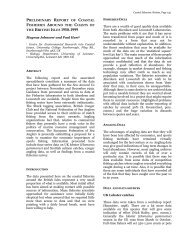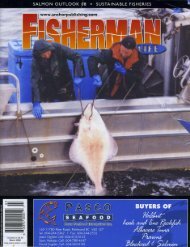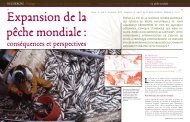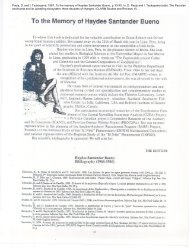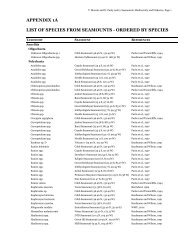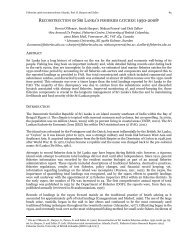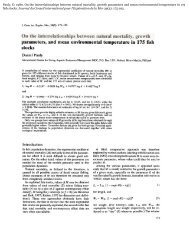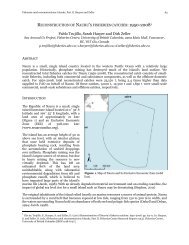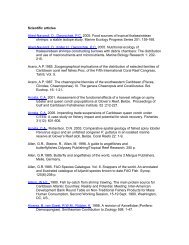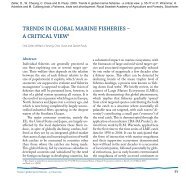Total marine fisheries extractions by country in the Baltic Sea
Total marine fisheries extractions by country in the Baltic Sea
Total marine fisheries extractions by country in the Baltic Sea
Create successful ePaper yourself
Turn your PDF publications into a flip-book with our unique Google optimized e-Paper software.
96 <strong>Total</strong> <strong>mar<strong>in</strong>e</strong> <strong>fisheries</strong> <strong>extractions</strong> <strong>by</strong> <strong>country</strong> <strong>in</strong> <strong>the</strong> <strong>Baltic</strong> <strong>Sea</strong>: 1950-present, Ross<strong>in</strong>g, Booth and Zeller<br />
lessen <strong>the</strong> pressures <strong>in</strong>duced <strong>by</strong> <strong>fisheries</strong> on salmon stocks, as well as allow more accurate account<strong>in</strong>g of<br />
salmon catches, as estimates of salmon taken <strong>by</strong> seals from set trap-nets would be unnecessary.<br />
Discards of herr<strong>in</strong>g were <strong>the</strong> most substantial <strong>by</strong> volume. The total discards of herr<strong>in</strong>g accounted for<br />
almost 80% of <strong>the</strong> discards of all taxa between 1950 and 2007. Though discards of herr<strong>in</strong>g were<br />
substantial <strong>by</strong> volume, <strong>the</strong>y accounted for only 8% of <strong>the</strong> total reported land<strong>in</strong>gs of herr<strong>in</strong>g <strong>by</strong> ICES, and<br />
6.5% of <strong>the</strong> overall reconstructed catch of herr<strong>in</strong>g between 1950 and 2007. This emphasizes how little<br />
economic <strong>in</strong>centive <strong>the</strong>re is to high-grade fish dest<strong>in</strong>ed for <strong>in</strong>dustrial purposes. The second most affected<br />
species <strong>by</strong> discards was sprat, which is due to it be<strong>in</strong>g caught as <strong>by</strong>catch <strong>in</strong> <strong>the</strong> pelagic herr<strong>in</strong>g fishery.<br />
Discards of flatfishes were <strong>the</strong> least severe (<strong>by</strong> volume) out of all F<strong>in</strong>nish <strong>fisheries</strong>, but represented about<br />
25% of <strong>the</strong> total land<strong>in</strong>gs of flatfishes reported to ICES and <strong>the</strong> responsible fish<strong>in</strong>g behaviors may be of<br />
significant concern. Flatfishes also represented a fairly large portion of <strong>the</strong> recreational catches, with over<br />
11,000 tonnes reported over <strong>the</strong> period of study.<br />
Recently, ICES reported some improvement of <strong>the</strong> eastern <strong>Baltic</strong> cod stock and recommended an <strong>in</strong>crease<br />
of <strong>the</strong> TAC <strong>by</strong> 15%. This is <strong>the</strong> maximum amount allowed under <strong>the</strong> EU‘s management plan for <strong>Baltic</strong> cod<br />
fish<strong>in</strong>g (Veem, 2009). The observed improvement <strong>in</strong> stock size, however, has not elevated cod abundance<br />
beyond what are considered historically low levels, which are still far from what would be considered<br />
susta<strong>in</strong>able <strong>in</strong> <strong>the</strong> long-term. Historically, ICES‘ scientifically-recommended TAC levels for <strong>the</strong><br />
management of cod stocks have been <strong>in</strong>creased due to so-called socio-economic factors with<strong>in</strong> <strong>the</strong> fish<strong>in</strong>g<br />
<strong>in</strong>dustry. It has been commonplace for ICES TAC recommendations to be <strong>in</strong>creased <strong>by</strong> a factor of 3 dur<strong>in</strong>g<br />
negotiations with <strong>the</strong> European Council of M<strong>in</strong>isters (WWF, 2006) and Russia.<br />
Our methods used all <strong>the</strong> <strong>in</strong>formation available to comb<strong>in</strong>e reported land<strong>in</strong>gs with estimates of IUU<br />
catches. Apart from <strong>the</strong> adjustments to commercial land<strong>in</strong>gs and recreational catches that were obta<strong>in</strong>ed<br />
from <strong>the</strong> dataset provided <strong>by</strong> <strong>the</strong> FGFRI, <strong>the</strong> majority of our estimates were derived from <strong>Baltic</strong>-wide data<br />
presented <strong>in</strong> ICES stock assessment work<strong>in</strong>g group reports. The number of countries whose discards or<br />
unreported (‗unallocated‘) land<strong>in</strong>gs are <strong>in</strong>cluded <strong>in</strong> <strong>the</strong>se <strong>Baltic</strong>-wide estimates is unknown due to publicly<br />
non-transparent confidentiality agreements. Thus, <strong>in</strong> some sense, under current regulations, countries are<br />
able to rema<strong>in</strong> anonymous and relatively unaccountable for IUU fish<strong>in</strong>g. Though some of <strong>the</strong>se data are<br />
available to <strong>the</strong> stock assessment community with<strong>in</strong> ICES, <strong>the</strong> ‗true‘ level of catches lacks transparency to<br />
<strong>the</strong> public who are <strong>the</strong> ultimate beneficiaries and owners of a common resource.<br />
Increased transparency with regard to all <strong>fisheries</strong> catches is necessary <strong>in</strong> order for all stakeholders to be<br />
<strong>in</strong>formed and to become <strong>in</strong>volved <strong>in</strong> <strong>the</strong> future well-be<strong>in</strong>g of <strong>the</strong> <strong>Baltic</strong> <strong>Sea</strong> ecosystem. In addition to<br />
<strong>in</strong>creased accountability and transparency of IUU catches of target species, regulations should require<br />
accountability for all species caught <strong>by</strong> fish<strong>in</strong>g gear whe<strong>the</strong>r or not <strong>the</strong>y are economically valuable, or<br />
whe<strong>the</strong>r <strong>the</strong>y are discarded or brought to port. When all catches result<strong>in</strong>g from fish<strong>in</strong>g gear are accounted<br />
for, management can beg<strong>in</strong> to evolve towards an ecosystem-based management system that considers <strong>the</strong><br />
whole ecosystem ra<strong>the</strong>r than focus<strong>in</strong>g on s<strong>in</strong>gle species <strong>in</strong> isolation from <strong>the</strong>ir environment. Records of<br />
<strong>the</strong>se catches will facilitate <strong>the</strong> model<strong>in</strong>g of <strong>Baltic</strong> <strong>Sea</strong> ecosystems and key ecosystem processes govern<strong>in</strong>g<br />
some of <strong>the</strong> observed issues. Such basel<strong>in</strong>e data would also provide <strong>the</strong> tools required to generate<br />
scenarios illustrat<strong>in</strong>g various management protocols and allow decision-makers and <strong>the</strong> public to make<br />
decisions based upon various biological, social and economic factors that <strong>in</strong>corporate both short- and<br />
long-term goals. An ecosystem-based management system will also require <strong>the</strong> cooperation of all <strong>Baltic</strong><br />
countries to contribute such data, so <strong>the</strong> ecosystem can be considered <strong>in</strong> its entirety.<br />
ACKNOWLEDGMENTS<br />
We would like to thank <strong>the</strong> <strong>Baltic</strong> <strong>Sea</strong> 2020 Foundation for fund<strong>in</strong>g this project. We would specifically like<br />
to thank Mika Rahika<strong>in</strong>en, Eero Aro, Anssi Ahvonen and Pirkko Söderkultalahti of <strong>the</strong> F<strong>in</strong>nish Game and<br />
Fisheries Research Institute for provid<strong>in</strong>g valuable <strong>in</strong>sight, <strong>in</strong>formation and data. The <strong>Sea</strong> Around Us<br />
Project is a scientific collaboration between <strong>the</strong> University of British Columbia and <strong>the</strong> Pew Environment<br />
Group.



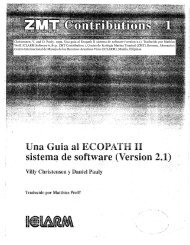

![Nacion.com, San José, Costa Rica [Nacionales] - Sea Around Us ...](https://img.yumpu.com/26166123/1/190x245/nacioncom-san-josac-costa-rica-nacionales-sea-around-us-.jpg?quality=85)
